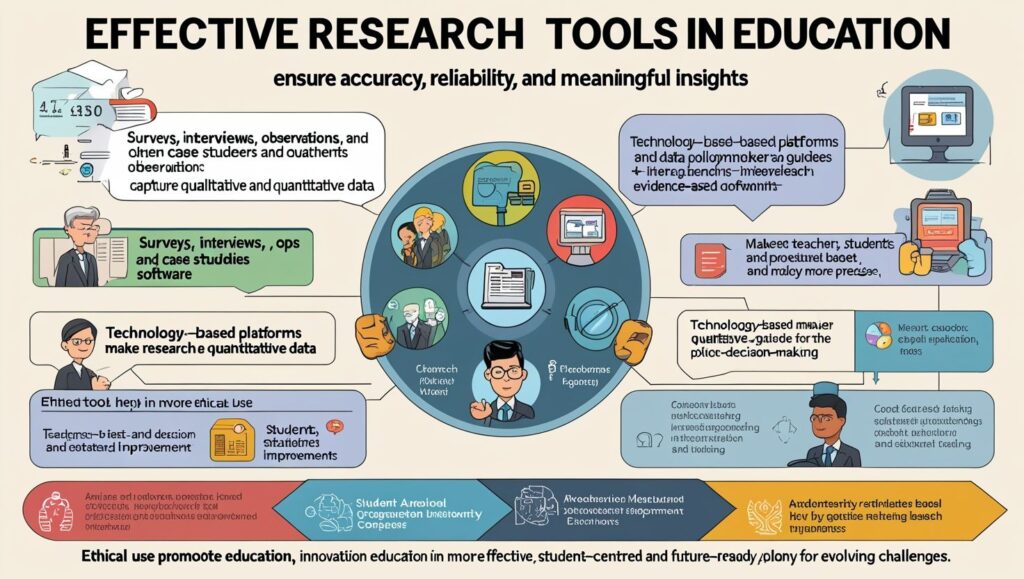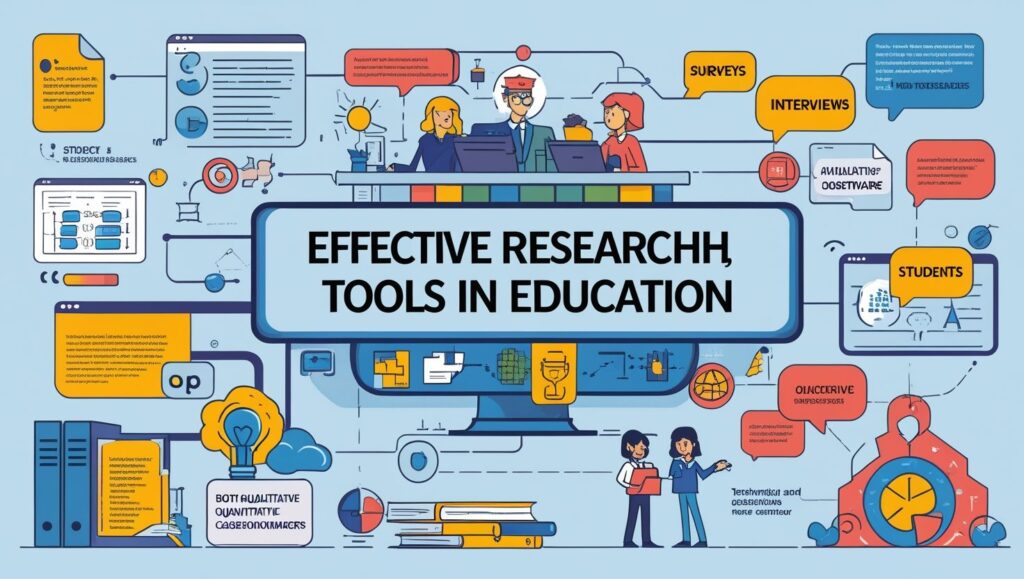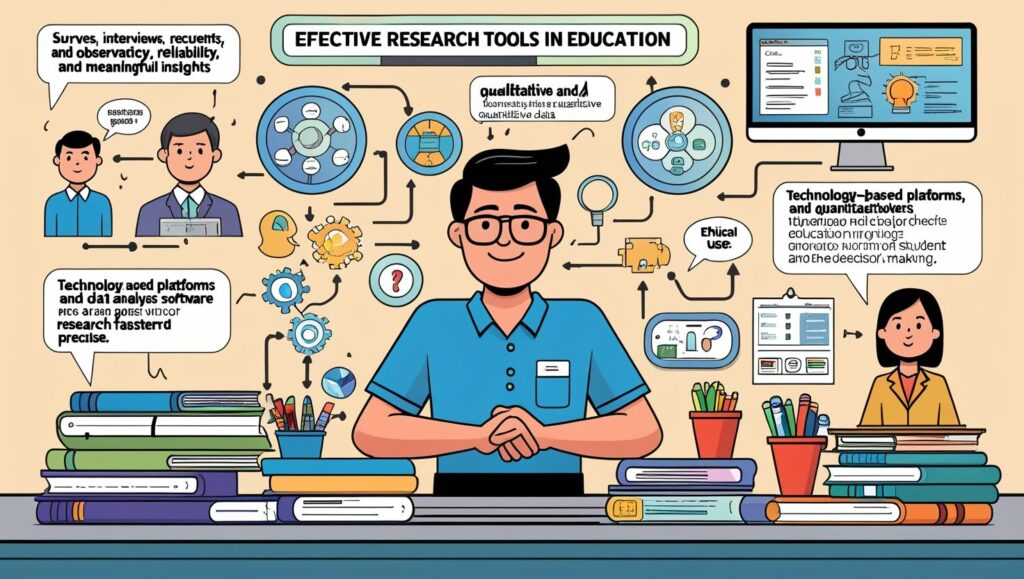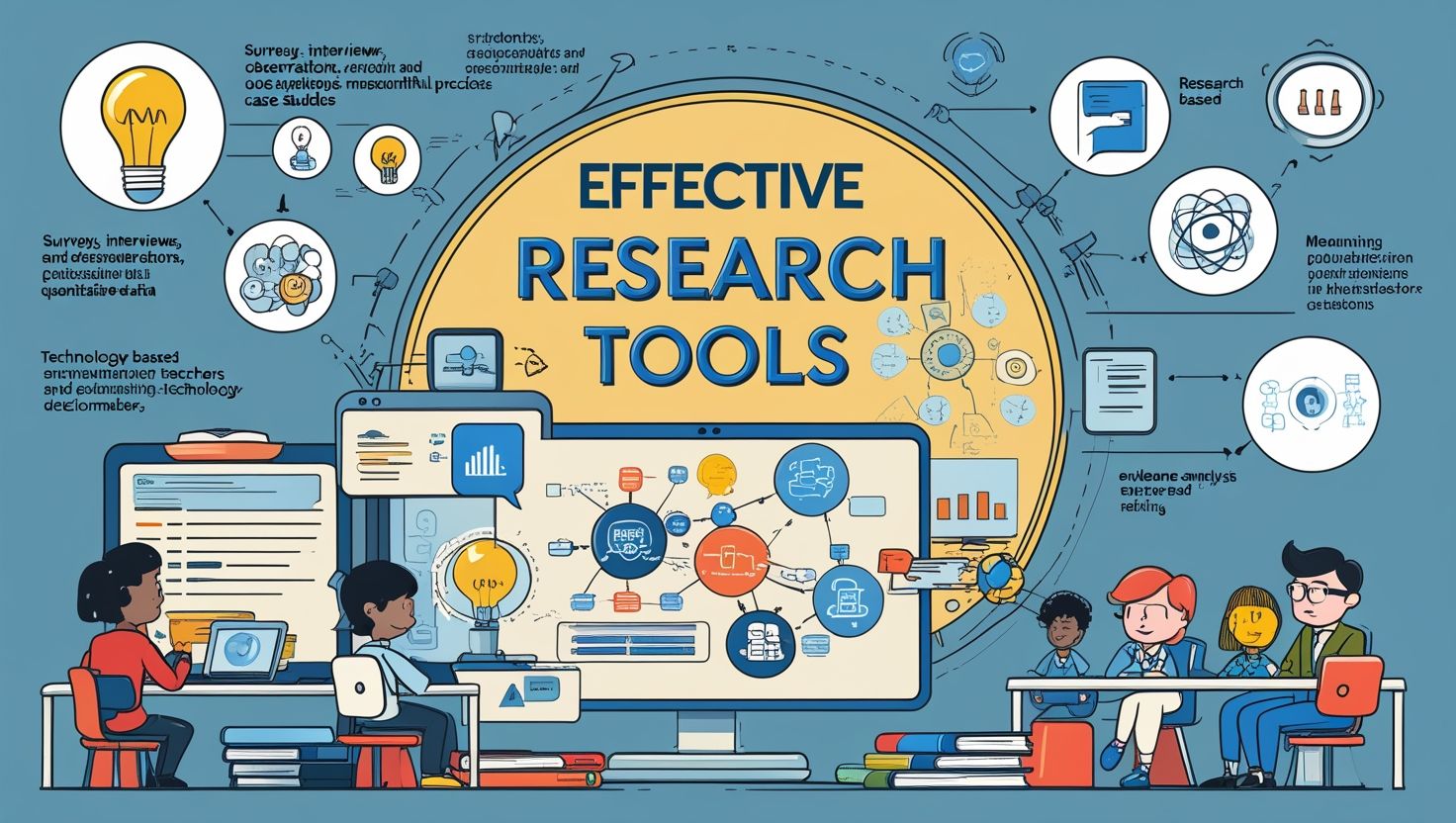Introduction
Effective Research Tools in Education, Education depends heavily on research for growth and improvement. Effective research tools provide the foundation for reliable data and insights. Teachers, students, and policymakers need authentic information to make informed decisions. Therefore, using appropriate tools becomes essential. These tools include surveys, questionnaires, interviews, and digital platforms. Each tool has specific strengths and can be applied in diverse contexts. Moreover, research tools help gather both qualitative and quantitative data.
They allow educators to analyze student performance, understand challenges, and design solutions. In addition, effective research tools ensure credibility, accuracy, and fairness in findings. With technology playing a bigger role, many advanced tools are now available for researchers. Hence, selecting the right tools not only saves time but also enhances the quality of educational research. Ultimately, effective tools are key to building strong educational practices that support better outcomes.
Importance of Research Tools in Education
Research tools are important because they shape the quality of educational findings. Without proper tools, data becomes unreliable and conclusions may be misleading. Moreover, education requires decisions backed by evidence, and tools provide that foundation. For instance, surveys help gather student opinions, while standardized tests measure performance levels. Additionally, interviews capture deeper insights into teacher or student experiences. Effective tools also ensure that research remains systematic and replicable.
Furthermore, these tools bridge the gap between theory and classroom practice. They help teachers evaluate teaching strategies and adapt methods for improvement. Importantly, policymakers also rely on such findings to implement reforms. Since education involves diverse learners, accurate tools are necessary for inclusive results. Therefore, research tools are not just instruments but essential elements that guide progress in learning environments. Their importance grows as education faces new challenges and evolving demands.

Surveys and Questionnaires
Surveys and questionnaires are among the most widely used research tools in education. They allow researchers to collect data from large groups quickly and cost-effectively. Moreover, they provide flexibility because questions can be open-ended or close-ended. Through surveys, teachers can gather student feedback on lessons, teaching styles, or classroom climate. Questionnaires also enable schools to evaluate parental involvement and community support. Furthermore, these tools provide measurable results, which are easy to analyze statistically. Importantly, online platforms make surveys more accessible and efficient. However, designing questions requires careful planning to avoid bias.
The wording must be clear and neutral to ensure valid responses. In addition, surveys offer anonymity, encouraging honest feedback from participants. Consequently, they support informed decision-making in education. Thus, surveys and questionnaires remain effective and reliable tools that continue to influence educational improvement across different contexts and levels.
Interviews and Focus Groups
Interviews and focus groups are qualitative research tools that explore experiences in detail. Unlike surveys, they allow direct interaction between researchers and participants. Consequently, they capture emotions, attitudes, and perspectives that numbers cannot explain. Interviews can be structured, semi-structured, or unstructured, depending on the purpose. Focus groups, on the other hand, involve discussions among multiple participants. These discussions encourage idea sharing and reveal diverse opinions. Furthermore, interviews help teachers understand student needs, challenges, and motivations. Focus groups are particularly useful for curriculum evaluation and policy development.
Moreover, the interactive setting promotes collaboration and deeper understanding. However, these methods require skilled facilitation to avoid bias or dominance by certain voices. Despite these challenges, they provide rich, detailed data that enhances educational research. Therefore, interviews and focus groups remain vital tools that add depth and context to findings in education.
Observations as Research Tools
Observation is another effective research tool used widely in education. It involves systematically watching and recording behaviors, interactions, and processes. Moreover, observations can be naturalistic, where researchers do not interfere, or structured, where specific criteria are followed. Teachers often use classroom observations to study student engagement, discipline, or participation. In addition, administrators observe lessons to evaluate teaching effectiveness. Observations provide real-time evidence, which makes them highly reliable. Furthermore, they capture details that surveys or interviews might miss. Importantly, they allow researchers to compare what people say with what actually happens.
However, observations require careful planning and objectivity to reduce bias. They can also be time-consuming. Despite these limitations, observation remains essential because it offers authentic insights into educational practices. Therefore, it is a strong research tool that supports improvement in both teaching and learning environments.

Standardized Tests and Assessments
Standardized tests and assessments are crucial research tools in education. They provide measurable data on student learning, achievement, and progress. Because tests are designed uniformly, they ensure fairness and comparability across different groups. Furthermore, they help identify strengths and weaknesses at both individual and institutional levels. Teachers use assessment results to adapt teaching strategies, while policymakers rely on data for curriculum development. Moreover, standardized assessments highlight learning gaps and support accountability.
However, over-reliance on testing can lead to stress and limit creativity. Therefore, balanced use is essential. Additionally, when combined with other tools like surveys or interviews, assessments provide comprehensive results. Importantly, technology has improved testing systems, making them faster and more accurate. Ultimately, standardized tests remain effective because they deliver clear, quantifiable evidence that drives educational planning, reforms, and improvement. They continue to be indispensable tools in research.
Case Studies in Education
Case studies are detailed examinations of specific individuals, groups, or institutions. They are highly effective because they provide deep insights into real-life educational situations. Moreover, case studies allow researchers to investigate complex issues in natural settings. For example, a case study might explore how a school adopted digital learning tools or how a student overcame learning challenges. These detailed accounts highlight processes, outcomes, and lessons. Furthermore, case studies combine multiple tools, including interviews, observations, and documents.
Therefore, they offer a holistic perspective. Importantly, they are useful for exploring new theories or evaluating practices. However, their findings are often context-specific and may not apply to all settings. Despite this limitation, they enrich educational research by presenting rich narratives. Consequently, case studies remain valuable tools that bridge the gap between theory and practice while promoting practical solutions in education.
Role of Technology-Based Tools
Technology has revolutionized research tools in education. Online platforms, learning management systems, and digital surveys simplify data collection. Furthermore, tools like Google Forms, Microsoft Teams, or SurveyMonkey make research more efficient. Advanced software, such as SPSS or NVivo, assists with data analysis. Additionally, virtual classrooms and digital observation tools allow researchers to study interactions remotely. Importantly, technology ensures accessibility, reducing barriers of distance and time.
Moreover, it supports collaboration among researchers worldwide. Data visualization tools also enhance understanding by presenting results clearly. However, effective use requires digital literacy and infrastructure. Without proper training, technology-based tools may not reach their full potential. Despite challenges, technology ensures faster, more accurate, and larger-scale educational research. Therefore, it continues to transform how researchers gather, analyze, and present information. Ultimately, technology-based tools are indispensable for modern, evidence-driven education research practices.
Data Analysis Tools
Collecting data is not enough; analyzing it effectively is equally important. Data analysis tools transform raw information into meaningful insights. In education, statistical software like SPSS, SAS, or R are widely used. Furthermore, qualitative analysis tools such as NVivo and Atlas.ti assist in coding and interpreting text data. These tools help identify patterns, trends, and relationships. Consequently, they support evidence-based decisions in education. Moreover, advanced data analytics allow predictive modeling, which forecasts student performance.
Teachers and policymakers benefit by identifying risk factors early. Additionally, visualization tools present findings in charts, graphs, or dashboards, making results accessible. However, using these tools requires training and expertise. Despite this, they save time and increase accuracy. Therefore, data analysis tools are effective resources that ensure educational research is reliable, comprehensive, and impactful in shaping better outcomes for students and schools.
Ethical Considerations in Using Research Tools
Ethics play a central role in using research tools in education. Since research often involves students, teachers, and communities, respect and fairness are essential. Moreover, informed consent ensures that participants willingly share information. Confidentiality protects identities and builds trust. Furthermore, researchers must avoid bias when designing surveys or interviews. Ethical considerations also include accuracy, where data must be reported honestly. Importantly, vulnerable groups such as children require extra protection.
Technology-based tools must also ensure data privacy and security. Additionally, ethical practices build credibility and prevent misuse of findings. Without ethics, even the most advanced tools lose their value. Therefore, researchers should balance efficiency with responsibility. By following ethical guidelines, they ensure that educational research remains respectful, trustworthy, and beneficial. Ultimately, ethics guide the responsible use of effective tools, ensuring research serves society positively and contributes to meaningful educational development.
Challenges in Using Research Tools
Although effective, research tools face several challenges in education. First, limited resources often restrict access to advanced tools and software. Moreover, lack of training prevents teachers and researchers from using them effectively. Time constraints also make it difficult to conduct thorough research. Additionally, language barriers and complex designs can reduce the reliability of surveys or interviews. Resistance from participants may lead to incomplete data.
Furthermore, technology-based tools raise concerns about data security and privacy. Sometimes, researchers also face difficulties in analyzing large datasets. Despite these challenges, solutions exist through training, collaboration, and ethical practices. Importantly, combining multiple tools reduces weaknesses and strengthens outcomes. Therefore, while challenges remain, they should not discourage research. Instead, they highlight the need for stronger support systems. Ultimately, overcoming these barriers ensures that effective research tools continue to guide educational improvement across different levels and contexts.

Future of Research Tools in Education
The future of research tools in education looks promising. With technology advancing, tools will become more sophisticated and accessible. Artificial intelligence and machine learning will play major roles in analyzing data. Consequently, predictive analytics will help forecast trends in student performance. Moreover, mobile apps will make surveys and assessments easier to conduct. Virtual reality may also allow immersive classroom observations. Additionally, cloud-based platforms will encourage global collaboration.
Importantly, future tools will focus on inclusivity, ensuring all learners are represented. Ethical frameworks will also evolve to address new challenges in data privacy. Furthermore, professional development will help educators effectively use modern tools. Although barriers exist, innovation will drive progress. Therefore, the future will see research tools becoming more powerful, user-friendly, and impactful. Ultimately, these advancements will strengthen the link between research and practice, ensuring continuous improvement in education.
Conclusion
Effective research tools are the backbone of educational progress. They allow educators to gather, analyze, and interpret data systematically. Moreover, tools like surveys, interviews, observations, assessments, and case studies provide comprehensive insights. Technology-based tools and data analysis software further enhance efficiency and accuracy. Importantly, ethical practices ensure fairness and trust in using these tools. While challenges such as limited resources exist, solutions lie in training and innovation.
Furthermore, the future holds exciting opportunities with artificial intelligence, predictive analytics, and global collaboration. Ultimately, effective research tools empower teachers, students, and policymakers. They support evidence-based decision-making and ensure education remains adaptive and relevant. Therefore, investing in effective tools is essential for shaping stronger, more inclusive, and future-ready learning environments. By embracing these resources responsibly, education can continue to evolve and serve society meaningfully in the modern era.
References
- Cohen, L., Manion, L., & Morrison, K. (2018). Research Methods in Education. Routledge.
- Creswell, J. W. (2014). Research Design: Qualitative, Quantitative, and Mixed Methods Approaches. Sage.
- McMillan, J. H., & Schumacher, S. (2010). Research in Education: Evidence-Based Inquiry. Pearson.
- O’Leary, Z. (2017). The Essential Guide to Doing Your Research Project. Sage.
- Punch, K. F., & Oancea, A. (2014). Introduction to Research Methods in Education. Sage.

This post cleared up so many questions for me.
What a helpful and well-structured post. Thanks a lot!
Very useful tips! I’m excited to implement them soon.
You’ve built a lot of trust through your consistency.
You’ve clearly done your research, and it shows.
I love how well-organized and detailed this post is.
Great job simplifying something so complex.
This was very well laid out and easy to follow.
That’s a great point about long-term value in racing! It’s smart to learn the ropes – like with the jljl55 ph app online casino – before diving into bigger bets. Building skills is key, whether it’s horses or games!
hf62xp
Hi, i believe that i saw you visited my site thus i got here
to go back the desire?.I’m trying to in finding issues to enhance my site!I suppose its adequate to make
use of a few of your concepts!! https://Glassi-Greyhounds.mystrikingly.com/